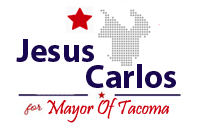Tacoma’s economy must work for everyone – from the small business owner on Hilltop to the tech startup in downtown to the longshore worker at the port. It has tremendous assets (a deep-water port, talented workforce, affordable space) but needs bold leadership to spur inclusive growth. Jesus’s economic development plan is focused on growth with equity: attracting new investments and jobs while lifting local businesses and workers. Key elements include:
- Good Jobs & Industry Growth: Partner with the Economic Development Board and Chamber of Commerce to aggressively recruit and retain employers in high-growth sectors. By 2050, the Puget Sound region expects Tacoma to add ~94,000 jobs; Jesus will now lay the groundwork targeting industries like clean energy technology, advanced manufacturing, maritime training, and healthcare. We will market Tacoma as an ideal destination for businesses priced out of Seattle, offering tax incentives or expedited permits for companies that bring living-wage jobs. A special focus will be on green industries and startups that align with our climate goals (e.g., solar panel manufacturing, electric vehicle assembly, recycling enterprises). The goal: create at least 5,000 new local jobs in the next mayoral term, prioritizing family-wage positions that can support Tacoma’s median income (currently about $83,800). Progress will be tracked via employment statistics and wage growth.
- Small Business Support & Entrepreneurship: Tacoma’s thousands of small businesses are the backbone of its economy. Jesus will work to establish a “Small Business Accelerator” program – providing grants, low-interest loans, and technical assistance to neighborhood businesses and startups. This includes cutting red tape at City Hall: streamlining licensing, permitting, and eliminating unnecessary fees for small enterprises. We’ll expand incubator spaces and mentorship networks, leveraging local institutions like UW Tacoma’s entrepreneurial center. A special emphasis will be placed on BIPOC- and women-owned businesses, to close historical gaps in access. By empowering diverse entrepreneurs, we create jobs and cultivate homegrown innovation. Success looks like higher small business survival rates and growth in new business registrations, particularly in underserved areas of the city.
- **Downtown & Neighborhood Revitalization: Tacoma neighborhoods are ripe for revitalization – from downtown’s commercial core to business districts like Lincoln, McKinley, and South Tacoma. Jesus will work to launch an initiative to invest in streetscape improvements, transit access, and public safety in key commercial corridors. We will activate vacant storefronts with pop-up shops and arts/cultural spaces, making it easier for new businesses to fill empty buildings. Waterfront development will proceed thoughtfully: clean up and redevelop underused waterfront lands (like the Tide flats) for mixed-use projects, including public recreation areas, with port jobs. We aim to attract more visitors and shoppers to Tacoma’s business districts by enhancing walkability and amenities. Metrics: increased foot traffic, sales tax revenue in revitalized areas, and a citywide decline in commercial vacancy rates.
- Workforce Development & Education: A thriving economy requires a local workforce. Jesus will champion workforce training programs, so Tacoma graduates are first in line for new jobs. We’ll collaborate with labor unions, Tacoma Public Schools, Tacoma Community College, UW Tacoma, and Joint Base Lewis-McChord (JBLM) on job training initiatives. Key efforts include vocational training in trades (to supply workers for construction and port industries), coding and IT bootcamps (leveraging the tech expansion in our region), and targeted programs for veterans transitioning from military to civilian careers. With about 9.4% of Tacoma’s population being veterans, higher than the state average, we will create a pipeline to connect veterans with skilled jobs in the private sector. Additionally, we’ll support youth apprenticeship and internship opportunities so high school and college students can gain work experience with Tacoma employers. Our success will be measured by reductions in the unemployment rate (currently ~4.5% in early 2025) and increases in Tacoma residents working in livable-wage jobs.
- Inclusive Economic Growth: Economic development must benefit all Tacoma residents, not just the wealthy. Today, income inequality is challenging – about 18% of Tacoma households earn under $25,000, while 19% earn over $150,000. Jesus is committed to narrowing that gap. The City will tie incentives for businesses to local hiring requirements and encourage investment in historically marginalized communities. We will work with the Port of Tacoma and Tribe partners to ensure expansion plans create opportunities for diverse contractors and workers. Equitable growth means tracking outcomes: we will monitor changes in poverty rates (currently ~12%) and make sure our economic gains translate into lower poverty and higher median incomes in Tacoma’s most disadvantaged neighborhoods.
Outcome Metrics: The economic plan’s success will be gauged by tangible results – job creation numbers, reduction in the poverty rate, growth in median household income, and increased business activity. By 2025 and beyond, Tacoma’s goal is to be known as a City of Destiny where anyone willing to work hard can find a good job or start a thriving business. Jesus’s administration will publish annual economic scorecards to track new jobs, new businesses, and diversity in hiring, holding the city accountable for delivering shared prosperity.

